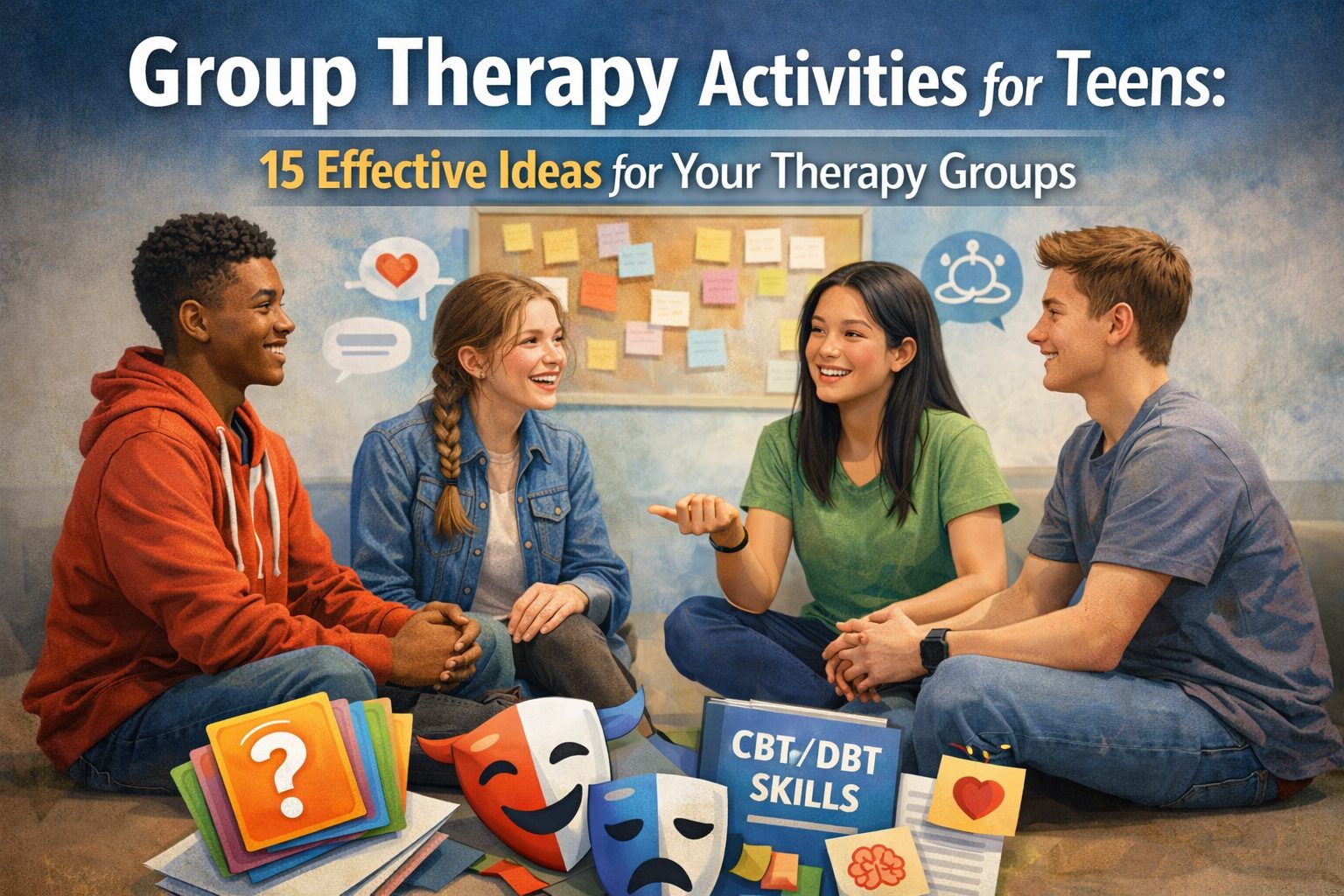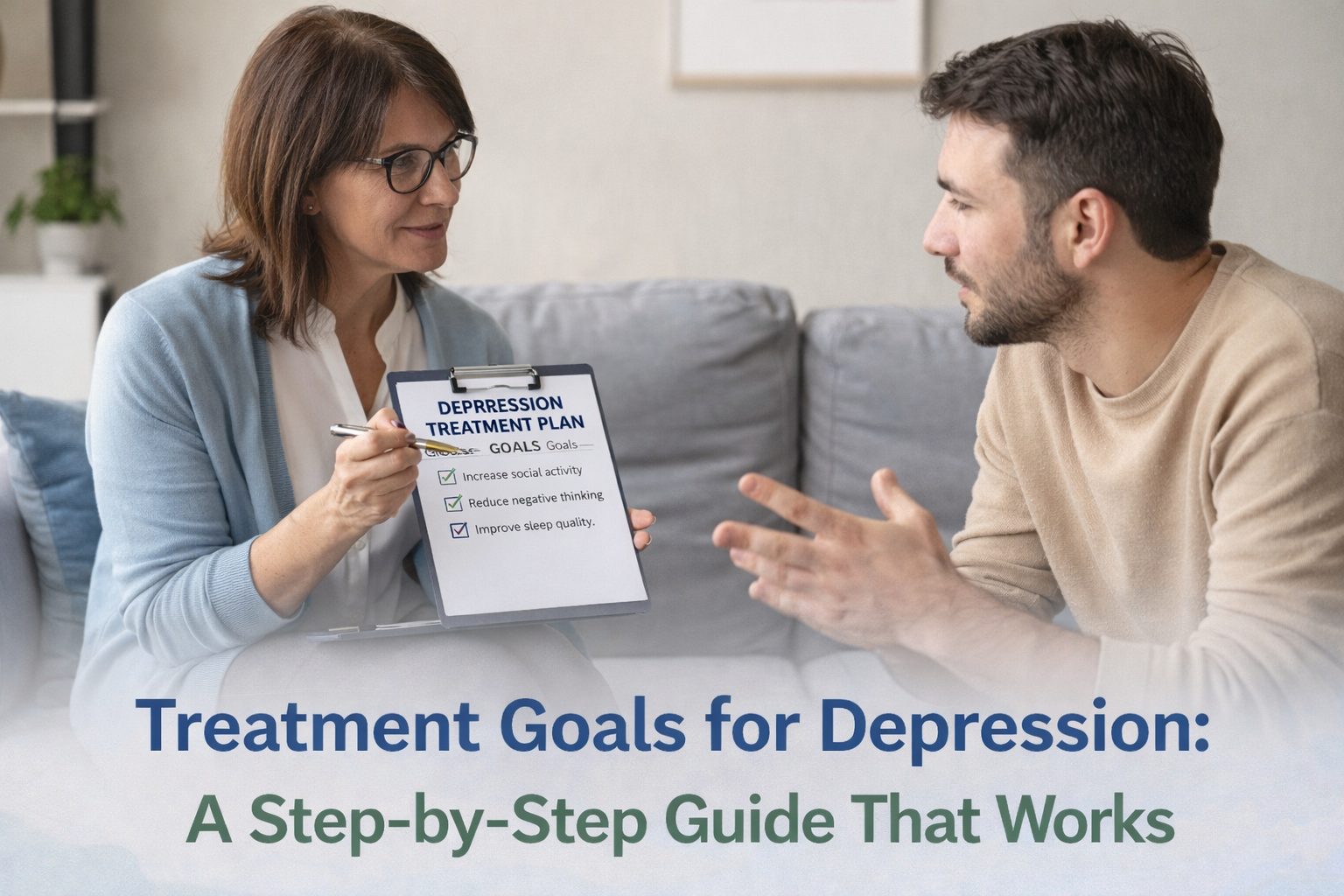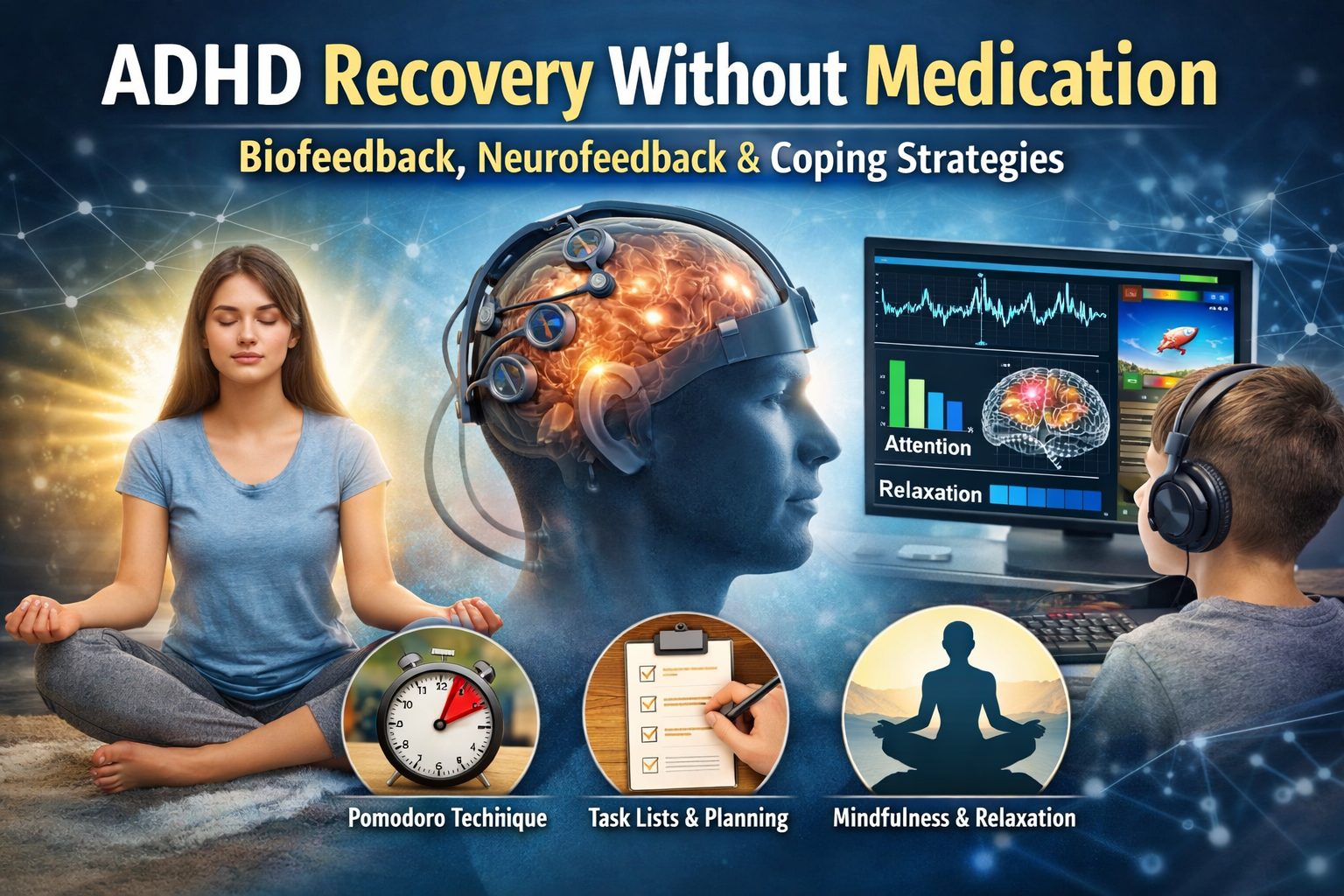Blog > Treatment Strategies > The Age of Consent for Mental Health Treatment by State
The Age of Consent for
Mental Health Treatment by State
Many young people avoid mental health treatment when parental consent is required, but most states allow minors to consent independently for certain services. Regulations vary significantly by state and treatment type. This guide breaks down state-specific requirements to help navigate minor consent laws for mental health care.

Last Updated: October 2, 2025

About 20-23% of adolescents in the United States had a mental health disorder in 2023, but only one-third received treatment. For some, this is due to the need to disclose treatment to their parents. While health treatment usually requires informed consent from adults, many states allow minors to give consent for mental health treatment.
This option can open up some important doors for accessing confidential care when minors might otherwise forego treatment, such as when therapy involves abuse, sexual activity or other topics that they may not want their parents to know about. These consent laws are essential, but they vary by state and can be difficult to put into practice due to challenges like billing. Anyone treating minors must have a solid understanding of their state's laws and how medical consent affects patient privacy laws and ethics.
Tired of Scrambling for the Right Consent Form?
Download this Consent Form Template for children and teens
✅ Set clear boundaries around fees, cancellations, and insurance
✅ Explain confidentiality in a way parents and minors can understand
✅ Stay compliant with client rights, emergencies, and referrals
Whether you're just starting your private practice or refining your intake process, this ready-to-use form helps you communicate policies clearly and protect yourself legally.
In most states, 18 is the age of majority, under which health care providers would need consent from the minor's parent or legal guardian. Still, many states have exceptions for sensitive types of treatment, including mental health. Minors can often consent to these at a younger age. The laws vary widely, and outpatient, inpatient and substance abuse treatments can all be treated differently.
When a minor is able to provide consent, they should also be able to receive confidential treatment. Court-emancipated minors are generally able to give consent in all states, and some states allow situationally emancipated minors — such as those who are married or on active military duty — to give consent, too. States without specific laws may have "mature minor" rules that allow minors to give consent if the provider finds them competent enough to understand the situation.
The list below offers general guidelines on the age of medical consent by state for mental health treatment. Note that substance abuse and medical treatment may differ. The information reflects who can give consent for both inpatient and outpatient mental health treatment unless otherwise specified, and "parent" can include guardians or other adults with the authority to grant consent. Most state laws are similar to the findings of this 2025 review, but we've provided sources for any updated legislation:
| State | Age of Consent / Conditions |
|---|---|
| Alabama | 14 |
| Alaska | 18 |
| Arizona | 18 (but a minor can consent if married, emancipated, or homeless) |
| Arkansas | 12 (if deemed mature enough by attending professional) |
| California | 12 (outpatient only; must be deemed mature enough) |
| Colorado | 15 |
| Connecticut | Licensed providers can conduct up to 6 sessions for minors without parental consent |
| Delaware | Parent for inpatient; parent or minor over 14 for outpatient |
| District of Columbia | 18 |
| Florida | Parent for inpatient; minor over 13 for outpatient |
| Georgia | 18 |
| Hawaii | Parent for inpatient; minor over 14 for outpatient |
| Idaho | Parent or minor for outpatient; parent or minor over 14 for inpatient* |
| Illinois | Parent for inpatient; minor over 16 for outpatient |
| Indiana | 18 |
| Iowa | 18 |
| Kansas | 14* |
| Kentucky | 16 |
| Louisiana | 16 |
| Maine | 18 |
| Maryland | 12 (outpatient only; maturity assessment required) |
| Massachusetts | 16* |
| Michigan | Minor over 14 for outpatient; parent for inpatient |
| Minnesota | 16 |
| Mississippi | 18 |
| Missouri | 18 |
| Montana | 16 |
| Nebraska | 18 |
| Nevada | 18 |
| New Hampshire | 16 |
| New Jersey | 16 |
| New Mexico | 14 |
| New York | Parent or minor over 16 for inpatient; parent or minor for outpatient** |
| North Carolina | 18 |
| North Dakota | 18 |
| Ohio | Parent for inpatient; minor over 14 for outpatient |
| Oklahoma | Minor over 16 for inpatient; parent for outpatient |
| Oregon | Parent for inpatient; minor over 14 for outpatient |
| Pennsylvania | Parent for inpatient; minor over 14 for outpatient |
| Rhode Island | 16 |
| South Carolina | 16 |
| South Dakota | 16 |
| Tennessee | 16 |
| Texas | 18 (16 if living independently and managing own finances) |
| Utah | 18 |
* When minors consent to inpatient treatment, parents are notified.
** In New York, minors can consent to outpatient treatment in certain conditions: when parents are unavailable, deny clinically appropriate services, or when parental involvement would be detrimental.
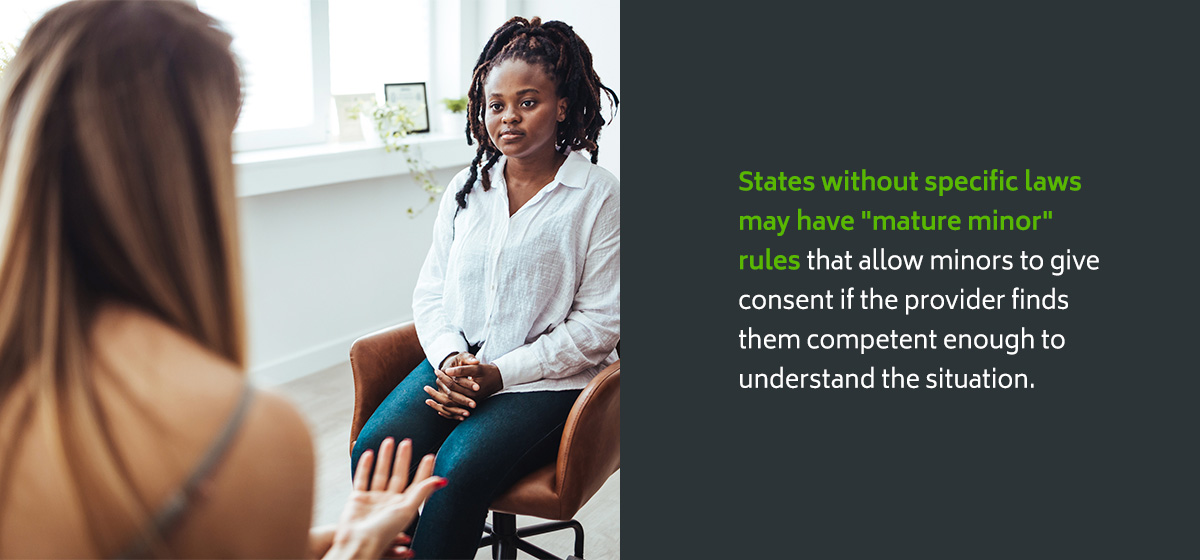
Understanding Informed Consent and Patient Privacy
Consent and patient privacy usually go hand in hand. Minors often want to give consent because they want their treatment to be kept private from their parents or guardians, but the two terms can mean very different things. Informed consent means that the person making the decisions is considered competent, understands the risks associated with treatment, and knows that it is voluntary. It does not guarantee privacy, especially when logistics are at play.
For example, if a minor patient bills their parent's insurance plan, the parent would see the claim in an explanation of benefits (EOB), making it hard to realistically keep treatment private in non-school settings.
Another privacy challenge comes from generalized information that providers may offer. Without explicitly sharing the contents of the visit, a provider might tell a parent that the child might have issues related to certain conditions, like depression or anxiety. If the parent wants more information, some states may allow them full access to treatment records. In others, if a minor is able to provide their consent for mental health services, the parent cannot view records without the patient's permission.
Most states leave room for professional judgment and mandated reporter responsibilities, such as when a minor is a danger to themselves or others. Conversely, a provider can withhold records from a parent or guardian if they believe the child has been or may be in danger due to situations like domestic violence or neglect.
With these nuances in mind, providers should be upfront with minors about the risks of keeping their treatment private, such as insurance statements. The American Medical Association's (AMA's) ethics code suggests that providers encourage minors to involve their parents and facilitate conversations between the two parties. It also suggests that providers address the patient's hesitation and correct any misconceptions.
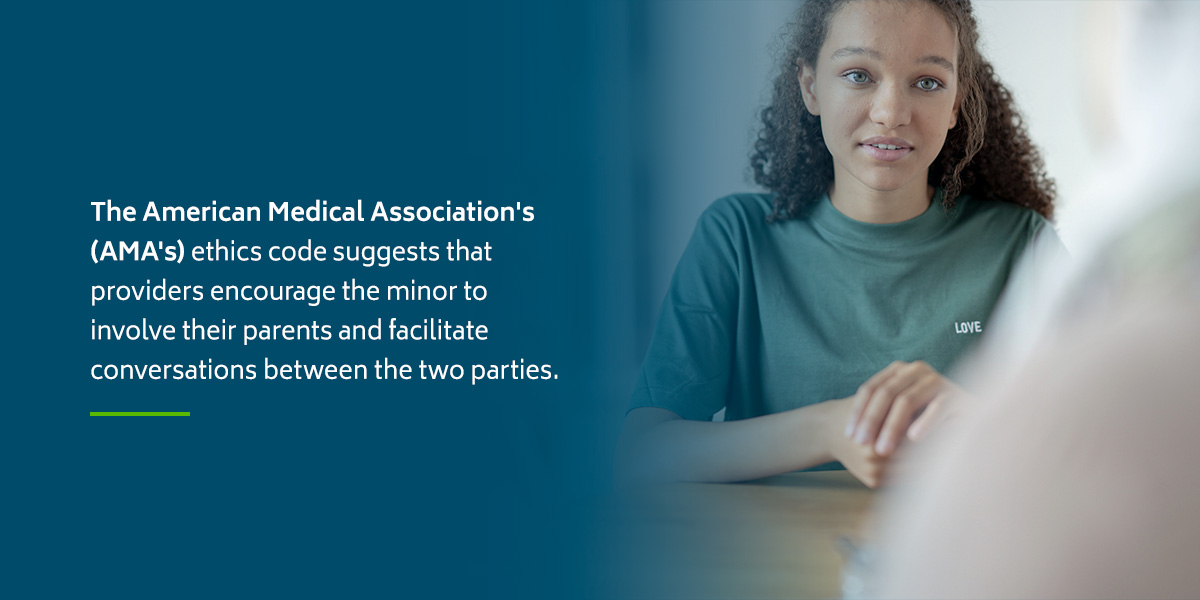
Understanding treatment consent is essential when working with young people. While many parents and guardians have the child's best interests at heart, some do not, and many minors will avoid treatment if they know it won't be kept private. They may not be willing to discuss sensitive topics like abuse or sexual activity, either. With informed treatment consent, you can help more teens get in the door and talk about their most pressing issues in a confident, candid manner.
Still, some providers are hesitant to take a minor's consent in lieu of the consent of a parent. Always consider the challenges, such as recordkeeping and billing, that may need to be disclosed to parents or guardians in your state, as well as your state's penalties for violations. You might want to keep sensitive records separated to avoid accidental disclosure.
Even if you don't need the minor's consent for treatment, it often helps to get their assent, a simple agreement to participate in treatment. It can help them better understand the process and take a more active role in the decision-making process, ideally providing more motivation for the treatment.
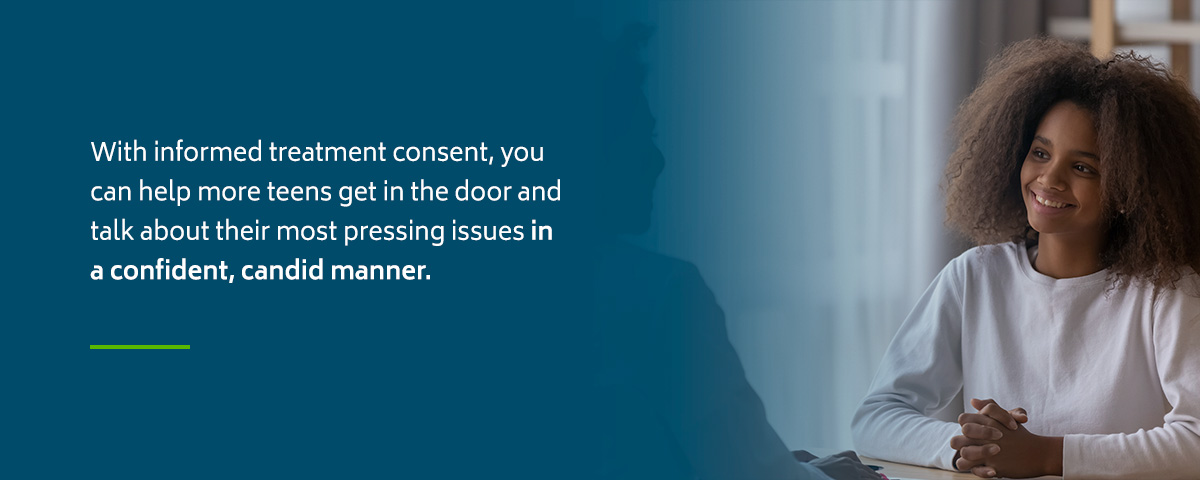
Frequently Asked Questions: Age of Consent for Mental Health Treatment
Understanding the age of consent for mental health treatment can be confusing, especially since laws vary widely across states and depend on the type of service being provided. Parents, providers, and young people often have questions about when a minor can independently give consent for treatment of a minor, what rights parents still hold, and how confidentiality applies. To help clarify these issues, we’ve compiled answers to the most frequently asked questions about minors’ ability to access outpatient therapy, inpatient care, and related services.
Find Out How ICANotes Can Help Your Practice
Your documentation and billing practices are a critical part of meeting minor consent laws for your state and protecting patient privacy. ICANotes is a behavioral health electronic health record (EHR) that is compliant with the Health Insurance Portability and Accountability Act (HIPAA) and offers a range of management tools, like password-protected psychotherapy notes for additional privacy and patient portals, to help you discreetly connect with your patients.
Robust, easy-to-navigate records allow you to include clear documentation about a minor's competency and any factors that contribute to their ability or inability to provide consent. ICANotes has a host of resources to help you navigate informed consent laws and better support your young patients. See ICANotes in action by booking a demo today, or reach out to us to learn more.
Start Your 30-Day Free Trial
Experience the most intuitive, clinically robust EHR designed for behavioral health professionals, built to streamline documentation, improve compliance, and enhance patient care.
- Complete Notes in Minutes - Purpose-built for behavioral health charting
- Always Audit-Ready – Structured documentation that meets payer requirements
- Keep Your Schedule Full – Automated reminders reduce costly no-shows
- Engage Clients Seamlessly – Secure portal for forms, messages, and payments
- HIPAA-Compliant Telehealth built into your workflow
Complete Notes in Minutes – Purpose-built for behavioral health charting
Always Audit-Ready – Structured documentation that meets payer requirements
Keep Your Schedule Full – Automated reminders reduce costly no-shows
Engage Clients Seamlessly – Secure portal for forms, messages, and payments
HIPAA-Compliant Telehealth built into your workflow
Related Posts
About the Author
Dr. October Boyles is a behavioral health expert and clinical leader with extensive expertise in nursing, compliance, and healthcare operations. With a Doctor of Nursing Practice (DNP) and advanced degrees in nursing, she specializes in evidence-based practices, EHR optimization, and improving outcomes in behavioral health settings. Dr. Boyles is passionate about empowering clinicians with the tools and strategies needed to deliver high-quality, patient-centered care.




